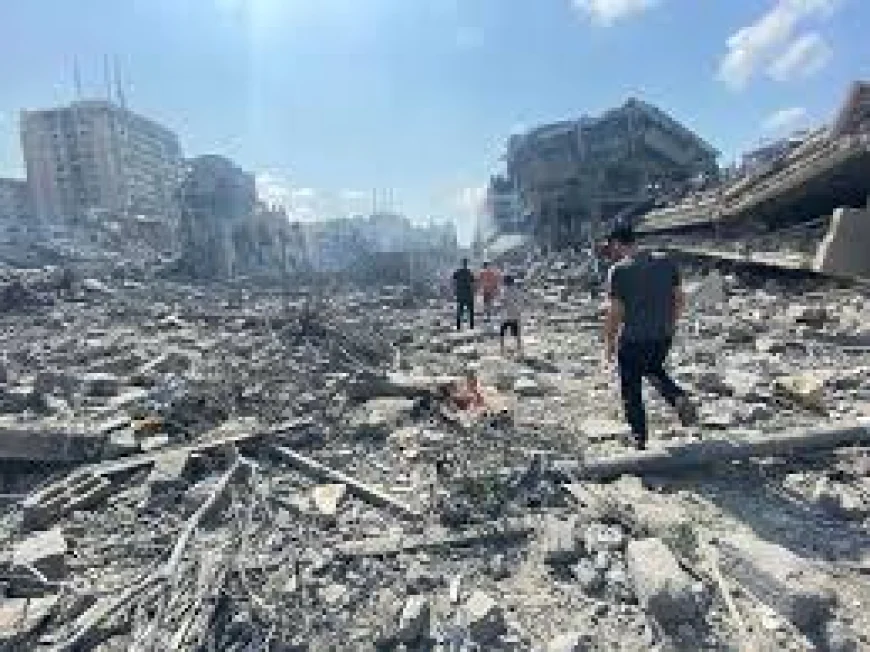Hamas Signals Readiness for Gaza Ceasefire Negotiations, Awaits Israel's Reply

Hamas reports it has given a "positive response" to the mediators regarding the latest peace proposal for a Gaza ceasefire and hostage exchange, suggested by the US.
The Palestinian group announced on Friday night that it was "seriously ready to start negotiations immediately," but it did not confirm whether it accepted all the terms. A senior Palestinian official told the BBC that Hamas asked for several changes, including stopping the US-backed aid system and getting a US assurance that the war wouldn't restart if talks failed. Israel's government has yet to comment.
US President Donald Trump said he hadn’t been briefed but noted it was "good" that Hamas had responded positively. He told reporters on Air Force One, "There could be a Gaza deal next week." Trump is eager to announce positive news when Israeli Prime Minister Benjamin Netanyahu visits the White House next week.
On Tuesday, Trump said Israel agreed to the "necessary conditions" for a 60-day ceasefire, during which they would try to stop the fighting. The plan involves Hamas releasing several Israeli hostages, including 10 live ones and the bodies of 18 others, in exchange for Palestinian prisoners held in Israeli jails.
At least 20 of the 50 hostages still in Gaza are believed to be alive. The proposal also calls for immediate entry of aid into Gaza, overseen by the UN and the Red Cross. A Palestinian official stated Hamas demands aid be distributed only by the UN and its partners, and they want the Gaza Humanitarian Foundation’s aid system, backed by Israel and the US, to end at once. Hamas also seeks Israeli troop withdrawals.
The US plan is said to involve a phased pullout, but Hamas reportedly wants troops to return to their positions before the ceasefire fell apart in March, when Israel resumed fighting.
Hamas also calls for a US guarantee that Israeli air and ground attacks won’t restart, even if the ceasefire collapses without a permanent peace. The plan suggests mediators will ensure negotiations start right away and that the ceasefire can be extended if needed.
Prime Minister Netanyahu refuses to end the war until all hostages are free and Hamas’s military and political power are broken. Some far-right ministers oppose the deal, pushing for more Israeli operations and a halt to aid. Israeli forces kept bombing Gaza on Friday. Gaza’s health ministry said Israeli strikes killed at least 138 Palestinians in the last day.
On Thursday night, airstrikes on two tents housing displaced people in Khan Younis killed at least 15 Palestinians, including 13-year-old Mahmoud al-Farr. Mahmoud's sister, Mayar, told Reuters she wished there had been a ceasefire before she lost her brother. Another relative, Adlar Mouamar, said, “Our hearts are broken. We want the bloodshed to stop.”
The Israeli military has not commented on the strikes but confirmed operations to weaken Hamas’s military. On the other hand, Médecins Sans Frontières said one of its former colleagues was among at least 16 killed when Israeli forces fired on aid workers in Khan Younis.
The military has not responded publicly. The UN human rights office reported that it has documented 509 deaths near aid centers and 104 near aid convoys. Their spokeswoman said investigations are ongoing, but it’s clear that Israel’s forces have used live fire against Palestinians trying to reach aid points.
The Gaza-based Gaza Humanitarian Foundation dismissed these figures, claiming they come from their own health ministry and are false. Their leader said no violent incidents have happened near their sites recently. The Israeli military called claims of heavy casualties at GHF sites “lies.”
Near the beach, activists displayed a large banner with the US flag and the words “liberty for all.” Among those speaking was Ruby Chen, father of Israeli-American Itay Chen. The soldier was killed during the October 7 attack by Hamas and is now held as a hostage in Gaza.
Ruby urged Netanyahu to go to the US next week and bring all the hostages home. Keith Siegel, another Israeli-American released after 484 days in captivity, said only a full deal can bring everyone back and help the Middle East move forward. Since the October 7 attack, Israel has launched a ground offensive in Gaza.
About 1,200 people were killed and 251 taken hostage during the attack. Gaza’s health ministry reports over 57,000 people have died there since then.


